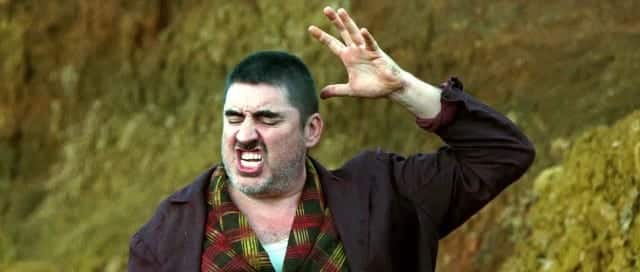Stephano is a character in Shakeseare’s play, The Tempest.
He is a survivor of a shipwreck off a remote island in the Mediterranean Sea. He is the butler of Alonso, the king of Naples, who, together with members of his court, including his son, Ferdinand, and members of the court of Milan, have also survived.

Alfred Molina as Stefano
Stephano is washed up on the beach with the court jester, Trinculo. They do not know about the other survivors, who have emerged from the sea on a different part of the island. During the course of the play Stephano and Trinculo appear together in all the scenes that contain them.
The Tempest is generally classed as a comedy, although the classifications of Shakespeare’s plays (comedy, tragedy, history, etc.) are somewhat cloudy and few of the plays fit neatly into any of those traditional categories. Plays like Twelfth Night and Much Ado About Nothing are not only comedic in their structure but funny throughout. The Tempest is not like those plays. It can be seen as many things, including a fantasy, a supernatural drama, a revenge play, a political play, and more. It is not funny throughout but whatever humour there is is provided by the antics of Stephano and Trinculo.
When we first meet Stephano we see that he has rescued a barrel of sack from the wreckage and is already drunk. We never see him sober as he drinks throughout the play and if ever an actor wanted to play a character who is drunk during the whole three hours of a play, this is the one for him.
The pair meet Prospero’s indigenous island slave, Caliban, soon after their arrival. Stephano gives him some sack, which makes him drunk and he begins to regard Stephano as a god. Stephano takes that seriously and fancies himself as the king and the rightful ruler of the island, with Caliban and Trinculo as his subjects.
In his drunken state he finds Caliban’s plan to overthrow Prospero appealing and the three plot a coup. That in itself is funny because they are so ridiculous, particularly so in the face of Prospero’s power, which goes beyond political to magical power. Moreover, Prospero is monitoring their machinations.
Whatever else is happening in the play, Shakespeare returns repeatedly to the antics of the three plotters, which echo, not only the original deposing of Prospero as Duke of Milan, but also what is going on among the other characters who are plotting to overthrow Alonso.
The comic absurdity of the rebellion by Stephano, Trinculo, and Caliban underlines the absurdity of the plotting of the European politicians, far away from their context, powerlessly marooned on an island, with no obvious means of escape, making their plot empty and, reflected by the drunken trio’s plot, comical.
The play has a strong political theme and Stephano becomes a parody of a politician. He is unremittingly self-interested and opportunistic. In what he sees as his place in the power structure he becomes dictatorial, ruling by threats – which is an echo of one of Prospero’s means of political control. His absurd ambition echoes that of the characters plotting to overthrow Alonso where, even if they were to succeed, they would gain nothing, given their geographical isolation. His intention to kill Prospero is not a matter of it’s possibly being the right thing to do, as is debated by politicians in Julius Caesar, but because it is a means to personal material reward.
Stephano is a swaggering braggart who loves to talk and boast about what he sees as his qualities, regarding such things as greed as virtues. He is noisy and boisterous and self-opinionated. He is gullible and believes everything Caliban tells him. He is easily distracted: when Prospero’s servant, Ariel, lays out a selection of fine clothes to distract him as he and his co-conspirators are closing in on Prospero’s cell he forgets about the plot as his greed takes possession of him.
Top Stephano Quotes
Stephano’s Song
The master, the swabber, the bo’sun and I,
The gunner and his mate
Loved Mall, Meg and Marian and Margery,
But none of us cared for Kate;
For she had a tongue with a tang,
Would cry to a sailor, Go hang!
She loved not the savour of tar nor of pitch,
Yet a tailor might scratch her where’er she did itch:
Then to sea, boys, and let her go hang! (act 2, scene 2)
Here, kiss the book. Though thou canst swim like a
duck, thou art made like a goose (act 2, scene 2)
I shall no more to sea, to sea,
Here shall I die ashore (act 2, scene 2)
Out o’ the moon, I do assure thee: I was the man i’
the moon when time was. (act 2, scene 2)
Prithee, do not turn me about; my stomach is not constant. (act 2, scene 2)
Moon-calf, speak once in thy life, if thou beest a
good moon-calf. (act 3, scene 2)
Trinculo, if you trouble him any more in’s tale, by
this hand, I will supplant some of your teeth. (act 3, scene 2)
Give me thy hand. I do begin to have bloody thoughts. (act 4, scene 1)




Leave a Reply
Want to join the discussion?Feel free to contribute!